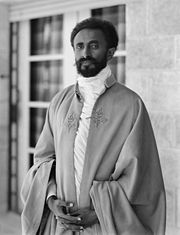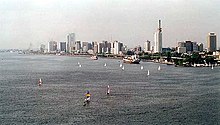Portal:Africa



Africa is the world's second-largest and second-most populous continent after Asia. At about 30.3 million km2 (11.7 million square miles) including adjacent islands, it covers 20% of Earth's land area and 6% of its total surface area. With nearly 1.4 billion people as of 2021, it accounts for about 18% of the world's human population. Africa's population is the youngest among all the continents; the median age in 2012 was 19.7, when the worldwide median age was 30.4. Based on 2024 projections, Africa's population will reach 3.8 billion people by 2099. Africa is the least wealthy inhabited continent per capita and second-least wealthy by total wealth, ahead of Oceania. Scholars have attributed this to different factors including geography, climate, corruption, colonialism, the Cold War, and neocolonialism. Despite this low concentration of wealth, recent economic expansion and a large and young population make Africa an important economic market in the broader global context. Africa has a large quantity of natural resources and food resources, including diamonds, sugar, salt, gold, iron, cobalt, uranium, copper, bauxite, silver, petroleum, natural gas, cocoa beans, and.
Africa straddles the equator and the prime meridian. It is the only continent to stretch from the northern temperate to the southern temperate zones. The majority of the continent and its countries are in the Northern Hemisphere, with a substantial portion and a number of countries in the Southern Hemisphere. Most of the continent lies in the tropics, except for a large part of Western Sahara, Algeria, Libya and Egypt, the northern tip of Mauritania, and the entire territories of Morocco and Tunisia, which in turn are located above the tropic of Cancer, in the northern temperate zone. In the other extreme of the continent, southern Namibia, southern Botswana, great parts of South Africa, the entire territories of Lesotho and Eswatini and the southern tips of Mozambique and Madagascar are located below the tropic of Capricorn, in the southern temperate zone.
Africa is highly biodiverse; it is the continent with the largest number of megafauna species, as it was least affected by the extinction of the Pleistocene megafauna. However, Africa is also heavily affected by a wide range of environmental issues, including desertification, deforestation, water scarcity, and pollution. These entrenched environmental concerns are expected to worsen as climate change impacts Africa. The UN Intergovernmental Panel on Climate Change has identified Africa as the continent most vulnerable to climate change.
The history of Africa is long, complex, and varied, and has often been under-appreciated by the global historical community. In African societies the oral word is revered, and they have generally recorded their history via oral tradition, which has led anthropologists to term them oral civilisations, contrasted with literate civilisations which pride the written word. During the colonial period, oral sources were deprecated by European historians, which gave them the impression Africa had no recorded history. African historiography became organized at the academic level in the mid-20th century, and saw a movement towards utilising oral sources in a multidisciplinary approach, culminating in the General History of Africa, edited by specialists from across the continent. (Full article...)
Selected article –
The Kennedy Airlift was started in 1959 by a 28-year-old Kenyan, Tom Mboya, who sought support for promising Kenyan students to get college and university educations in the United States and Canada. It brought hundreds of students from East Africa from 1959 to 1963 and was supported by many North American educational institutions, foundations, and individuals such as the African American Students Foundation (AASF) and African Americans including Harry Belafonte, Jackie Robinson, Sidney Poitier, and Martin Luther King Jr. It got its popular nickname in September 1960 when Senator John F. Kennedy in a close presidential campaign arranged a $100,000 donation from the Joseph P. Kennedy Jr Foundation to cover airfare for the autumn 1960 group of East African students just as the program was running out of funds. (Full article...)
Featured pictures –
Did you know (auto-generated) -

- ... that one way to tell the African dusky flycatcher apart from the ashy flycatcher is that the former is "cuter"?
- ... that when the pastor of an African-American church bought the El Dorado, one newspaper wrote that "its occupants are white, and were white"?
- ... that a former member of the French Senate ended up being exiled to the northern Central African Republic by the future emperor?
- ... that South African nurse Stella Madzimbamuto filed an appeal in 1968 with the Privy Council of the United Kingdom that resulted in the Rhodesian government being declared illegal?
- ... that after the 1999 Tempe military base shooting, the Pan African Congress demanded a military funeral for the perpetrator?
- ... that the bronze statue atop Thomas Eyre Macklin's 1907 South African War Memorial in Newcastle became known as the "Dirty Angel"?
Categories
Selected biography –
Pieter Kenyon Fleming-Voltelyn van der Byl GLM ID (11 November 1923 – 15 November 1999) was a Rhodesian politician who served as his country's Foreign Minister from 1974 to 1979 as a member of the Rhodesian Front (RF). A close associate of Prime Minister Ian Smith, Van der Byl opposed attempts to compromise with the British government and domestic black nationalist opposition on the issue of majority rule throughout most of his time in government. However, in the late 1970s he supported the moves which led to majority rule and internationally recognised independence for Zimbabwe.
Van der Byl was born and raised in Cape Town, the son of the South African politician P V van der Byl, and served in the Middle East and Europe during the Second World War. After a high-flying international education, he moved to the self-governing British colony of Southern Rhodesia in 1950 to manage family farms. He went into politics in the early 1960s through his involvement with farming trade bodies, and became a government minister responsible for propaganda. One of the leading agitators for Rhodesia's Unilateral Declaration of Independence in 1965, Van der Byl was afterwards responsible for introducing press censorship. He was unsuccessful in his attempt to persuade international opinion to recognise Rhodesia, but was popular among members of his own party. (Full article...)
Selected country –
 |
 |
|

| ||
Djibouti (Arabic: جيبوتي Jībūtī, Somali: Jabuuti), officially the Republic of Djibouti, is a small country in eastern Africa. Djibouti is bordered by Eritrea in the north, Ethiopia in the west and south, and Somaliland in the southeast. The remainder of the border is formed by the Red Sea and the Gulf of Aden. On the other side of the Red Sea, on the Arabian Peninsula, 20 kilometres (12 mi) from the coast of Djibouti, is Yemen. The capital of Djibouti is the city of Djibouti.
The Republic of Djibouti gained its independence from France on June 27, 1977. It is a semi-presidential republic, with executive power held by the central government and legislative power by both the government and parliament. The parliamentary party system is dominated by the People's Rally for Progress and the current President is Ismail Omar Guelleh. The country's current constitution was approved in September 1992. Djibouti is a one party dominant state with the People's Rally for Progress in power. Opposition parties are allowed, but have no real chance of gaining power. (Read more...)
Selected city –
Lagos (/ˈleɪɡɒs/ LAY-goss; also US: /ˈlɑːɡoʊs/ LAH-gohss; Yoruba: Èkó), or Lagos City, is a large metropolitan city in southwest Nigeria. With an upper population estimated above 21 million dwellers, it is the largest city in Nigeria, and the most populous urban area on the African continent. Lagos was the national capital of Nigeria until the government's December 1991 decision to move their capital to Abuja in the centre of the country. Lagos is a major African financial centre and is the economic hub of Lagos State and Nigeria at large. The city has a significant influence on commerce, entertainment, technology, education, politics, tourism, art, and fashion in Africa. Lagos is also among the top ten of the world's fastest-growing cities and urban areas. In 2024, Time Out magazine ranked Lagos as the 19th Best City to visit in the World. A megacity, it has the fourth-highest GDP in Africa, and houses one of the largest and busiest seaports on the continent. Due to the large urban population and port traffic volumes, Lagos is classified as a Medium-Port Megacity.
Lagos emerged as a home to the Awori subgroup of the Yoruba of West Africa in the 15th century, which are contained in the present-day Local Government Areas (LGAs) of Lagos Island, Eti-Osa, Amuwo-Odofin and Apapa. Before the 15th century, the Awori settled on a Farmstead along the coastal line in and around which they worked and lived. The Farmstead translates to Ereko in Yoruba, from which comes the Lagos indigenous name "Eko". The lands are separated by creeks, fringing the southwest mouth of Lagos Lagoon, while being protected from the Atlantic Ocean by barrier islands and long sand spits such as Bar Beach, which stretch up to 100 km (62 mi) east and west of the mouth. Due to rapid urbanisation, the city expanded to the west of the lagoon to include areas in the present day Lagos Mainland, Ajeromi-Ifelodun, and Surulere. This led to the classification of Lagos into two main areas: the Island, which was the original city of Lagos, and the Mainland, which it has since expanded into. This city area was governed directly by the Federal Government through the Lagos City Council, until the creation of Lagos State in 1967, which led to the splitting of Lagos city into the present-day seven Local Government Areas (LGAs), and an addition of other towns (which now make up 13 LGAs) from the then Western Region to form the state. (Full article...)
In the news
- 1 February 2025 – War against the Islamic State
- War in Somalia
- Al-Shabaab insurgency in Somalia
- At least 50 combatants are killed after fighting between Al-Shabaab and the Somali National Army along with Ma'awisley militias. The clashes happened in the Hiiraan and Middle Shabelle regions of Hirshabelle state, Somalia. (Idil News) (Mepa News)
- American military intervention in Somalia, Islamic State insurgency in Puntland
- U.S. President Donald Trump orders the military to carry out airstrikes against Islamic State positions in Somalia. The strikes targeted a series of cave systems used by the group, and follow an earlier military operation by the Puntland Security Force which began in December 2024. (Idil News) (Garowe Online) (BBC)
- 1 February 2025 – Sudanese civil war
- Battle of Khartoum
Updated: 15:05, 2 February 2025
General images -
Africa topics
More did you know –
- ... that Liberia College in the country of Liberia was authorized by the legislature in 1851, but did not start classes until 1863?
- ... that the forced removal of 700,000 people from slums in Zimbabwe in 2005 was called "a crime against humanity" by the UN?
- ... that the supreme god of the southern African Bushmen is Cagn, a trickster who shapeshifts into a praying mantis?
- ... that Bahá'í Faith in Niger began during a period of wide scale growth in the religion across Sub-Saharan Africa near the end of its colonial period?
Related portals
Major Religions in Africa
North Africa
West Africa
Central Africa
East Africa
Southern Africa
Associated Wikimedia
The following Wikimedia Foundation sister projects provide more on this subject:
-
Commons
Free media repository -
Wikibooks
Free textbooks and manuals -
Wikidata
Free knowledge base -
Wikinews
Free-content news -
Wikiquote
Collection of quotations -
Wikisource
Free-content library -
Wikispecies
Directory of species -
Wikiversity
Free learning tools -
Wikivoyage
Free travel guide -
Wiktionary
Dictionary and thesaurus























































































